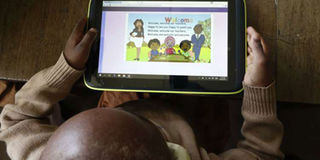150 schools to get tablets for pupils by next week

A pupil at St Marys Primary School in Nakuru uses a tablet after the rollout of the devices on May 5, 2016. The tablets have been installed with Science, Mathematics, English and Kiswahili lessons among others. PHOTO | SULEIMAN MBATIAH | NATION MEDIA GROUP
What you need to know:
- The successes and challenges during the POC phase will inform the full rollout of the Digital Literacy Programme, which has been branded Digischool.
- Education Cabinet Secretary Fred Matiang’i said the exercise is a major milestone towards preparing young Kenyans to be competitive globally.
The distribution of over 12,000 learning devices to 150 public primary schools as the pilot for Digital Literacy Programme will be concluded next week.
The distribution of the tablets started on Wednesday with an initial delivery to four primary schools.
The devices will be used for teaching and learning by pupils in primary schools across the country.
The 150 schools earmarked under Proof of Concept (POC) phase, is being implemented by Moi
University and JP Couto and Jomo Kenyatta University of Agriculture and Technology and Positivo BGH.
They are demonstrating their capability to distribute and install the devices to all public primary schools in the country come July this year.
The successes and challenges during the POC phase will inform the full rollout of the Digital Literacy Programme, which has been branded Digischool.
Education Cabinet Secretary Fred Matiang’i said the exercise is a major milestone towards preparing young Kenyans to be competitive globally.
“In July this year, we will start the delivery of devices to 11,000 schools as we start the rollout of the programme in earnest,” he said.
He disclosed that by March next year, the government expects to have covered all 23,952 public primary schools.
“A total of 1.2 million devices will be delivered to public primary schools across the country by next year,” Dr Matiang’i said.
Dr Matiang’i made the remarks on Thursday when he inspected the handing over of 104 devices to Musa Gitau Primary School in Kiambu County and 115 devices to Ndurarua Primary School in Nairobi County.
The devices being handed to schools include; luminous green tablet for the pupils, sky blue laptop for the teachers, projector and digital content server and wireless router. Special schools will receive a sky blue laptop for special needs learners and a Braille embosser.
The devices are pre-loaded with content for Standard One and Two in five subjects, approved by the Kenya Institute of Curriculum Development (KICD).
Content for other classes are set to be made available before the end of the year.
Teachers will use laptops as their main tools of instruction while pupils will use tablets.
The laptops will be used for developing content and applications.
Last month, Teacher Service Commission (TSC) trained more than 300 teachers from the 150 pilot schools.
At least 3 teachers in all the 23,000 schools have been trained on ICT.
In total, around 66,000 teachers have been trained.
Already over 22,237 schools have been connected to the national electricity grid and the Ministry of Energy and Petroleum has indicated that it is in the final stages of connecting the remaining schools.
JKUAT is expected to cover 21 counties while Moi University will cover the remaining 26 counties.
Ministry of Interior and Coordination of National Government is expected to provide security to schools when need arises in collaboration with the community to ensure the safety of devices.




